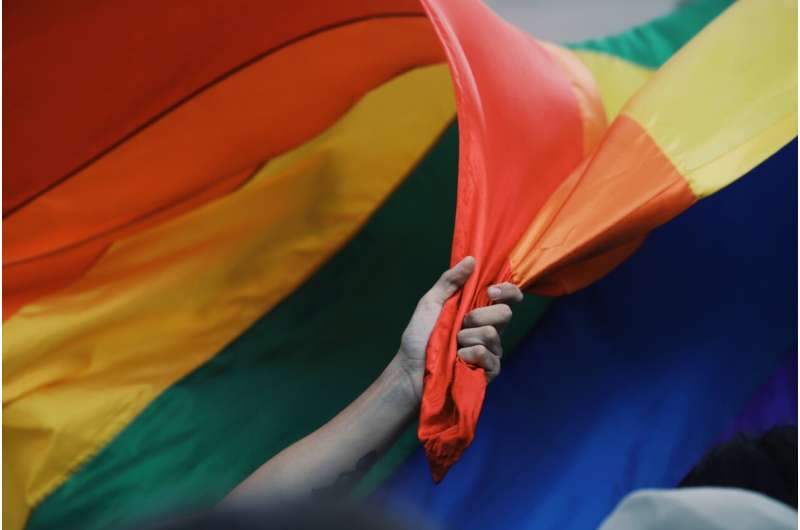This article has been reviewed according to Science X's editorial process and policies. Editors have highlighted the following attributes while ensuring the content's credibility:
fact-checked
trusted source
proofread
Anti-LGBTQ+ policies linked to depression in Black and Latinx youth

Black and Latinx LGBTQ+ youth living in U.S. states with discriminatory policies, such as "Don't Say Gay" laws, are more likely to be depressed than their peers in the most LGBTQ+-affirming states, according to new research from Yale School of Public Health (YSPH) scholars.
When controlling for individual experiences of bullying based on race and ethnicity or sexual orientation, Black and Latinx LGBTQ+ youth in states without protections—such as anti-bullying legislation and conversion therapy bans—are 32% more likely to experience symptoms of depression, according to the research published June 22 in the Journal of Psychopathology and Clinical Science.
"This study provides scientific evidence to what many queer and trans people of color in the U.S. are experiencing day to day," said co-author Tyler Harvey, program administrator of the Yale School of Medicine's SEICHE Center for Health and Justice. "Queer and trans youth living in states such as Florida that are passing anti-LGBTQ+ legislation know this to be true: their surroundings are influencing their mental health."
The article includes a map that researchers believe is the first youth-focused U.S. state-level measure of anti-LGBTQ+ structural stigma, said lead author Skyler Jackson, an assistant professor in the YSPH Department of Social and Behavioral Sciences. States were ranked based on nine anti-LGBTQ+ structural stigma indicators specifically relevant to adolescents. Two indicators were considered harmful (the presence of "Don't Say Gay" laws and anti-LGBTQ+ community attitudes), while others, such as a greater density of high schools with gender-sexuality alliances (formerly known as gay-straight alliances), were protective.
Alabama, Oklahoma, and Texas were found to have the highest anti-LGBTQ+ structural stigma. California had the lowest.
Completing the puzzle
While previous studies on discrimination have focused on everyday interpersonal experiences, such as bullying at school, Jackson said this new work broadens that scope.
"The laws, policies, and overall social conditions within which individuals live take a toll on their health and well-being," Jackson said. "This study helps to complete the puzzle of the various ways that stigma might show up within the lives of LGBTQ+ individuals."
Jackson is part of a team of researchers and staff members from YSPH, the Yale School of Medicine, and the Yale Department of Psychology who are affiliated with the Yale LGBTQ+ Mental Health Initiative. The initiative is devoted to understanding and improving the mental health of LGBTQ+ populations in the U.S. and around the world.
There has been a need for research that demonstrates that decisions made at the state level can impact the daily lives of young people," Jackson said.
"The laws that many of us view as unjust, as hateful, don't exist in a vacuum with no real consequences," he said. "When policies are implemented that undermine the rights, protections, and dignity of LGBTQ+ individuals, that's felt in real and tangible ways. We are becoming more acutely aware of this as there are so many sociopolitical battles going on across the country right now, particularly related to trans kids and adolescents."
A focused approach
Starting with the subpopulation of Black and Latinx LGBTQ+ youth was another unique aspect of the study, said Jackson.
"While most research of this kind begins with a broad cross-section of the LGBTQ+ population and adopts a one-size-fits-all approach, we made the decision to begin at the margins and consider how youth may experience anti-LGBTQ+ structural stigma alongside other forms of discrimination, such as racial/ethnic bullying," he said.
Jackson said he adopted this approach out of concern that previous studies have failed to accurately reflect the broad diversity of the populations they intend to describe. Both identity and stigma, he said, are multi-layered.
"Unfortunately, our field often neglects to take the extra steps to ensure our major findings remain consistent among the smaller, marginalized, and less prototypical segments of the LGBTQ+ community," Jackson said. For example, he said, broad findings that are produced by studies on LGBTQ+ people generally, might not apply—or apply to the same extent—when examined among specific subgroups such as LGBTQ+ people of color, queer women, trans/nonbinary people, bisexual/pansexual people, LGBTQ+ people of at different stages of life, LGBTQ+ people in non-Western contexts, and so on.
Also, focusing on a marginalized group can result in different research questions, science, and even eventual interventions, Jackson said.
"It still will take time for us to learn how structural stigma might land differently among LGBTQ+ youth of color," he added.
Along with Jackson and Harvey, who presented their work in March at the 2023 International Convention of Psychological Science sponsored by the Association for Psychological Science in Brussels, the study's co-authors are Kobe Pereira, a former YSPH research assistant, Kirsty Clark, an assistant professor at Vanderbilt University, and Ryan Watson, an associate professor at the University of Connecticut.
More information: Skyler D. Jackson et al, Multilevel stigma and depression among a national sample of Black and Latinx LGBTQ+ adolescents in the United States., Journal of Psychopathology and Clinical Science (2023). DOI: 10.1037/abn0000841



















